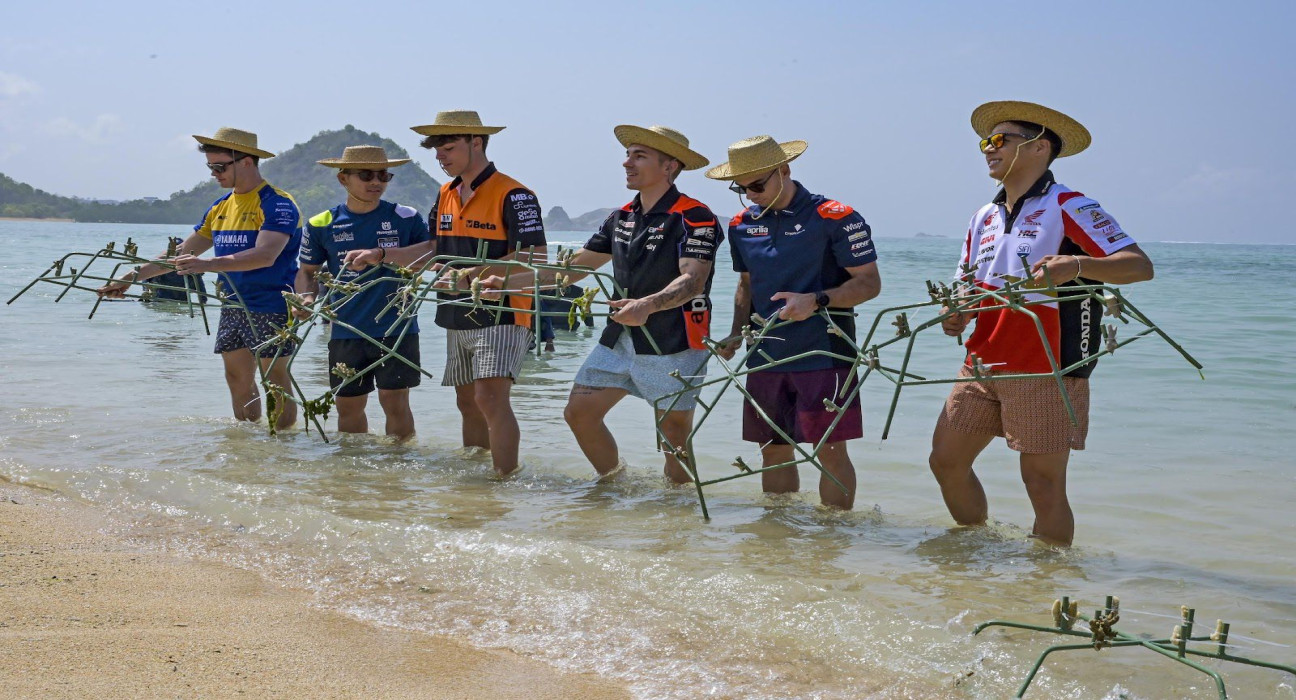Bali, 14 October 2023 – In 2020, Trevor Nace wrote an article in Forbes. He said scientists had predicted that almost 90 percent of the Earth’s coral reefs would disappear due to the rising sea temperature, high acidity of seawater, pollution, and human civilization.
Coral reefs are part of the coastal ecosystem with many benefits, including as a breeding ground, food source, and a sanctuary for reef fishes. Therefore, they are essential sources of food and income for hundreds of millions of people living in island and archipelagic countries.
Indonesia, as one of the world's largest archipelagic countries, is located in one of the most diverse coral reef ecosystems in the world, called the Coral Triangle. This area covers more than 6 million square kilometers extending from Indonesia to the Solomon Islands. Conservation organization, the World Wildlife Fund (WWF), estimated that by 2100, the area will eventually disappear.
Being aware of the threat, Jotje Aquarista Ingratubun, a lecturer at Ottow Geissler University in Jayapura, and her students created an affordable and sustainable coral reef.
Initially, the students were worried about the coral reef ecosystem in the waters of Papua as the coverage area was getting lower and lower. In 2013, the coverage area of coral reefs in Papua was recorded at around 670,000 hectares. However, by 2022, it had dropped to 262,378 hectares.
Household waste pollution carried by river currents affected the water quality and thus disrupted the growth of coral reefs. This condition was worsened by the use of non-environmentally friendly fishing gear.
The Ottow Geissler University team started to work hard and came up with the idea of using artificial coral reef technology. Although the technology had already existed, they innovated by utilizing accessible materials that would not harm the environment and called the technology Bioreeftek.
This green and simple technology used natural coconut shells as a medium to attach coral reef organisms into new individual colonies or reefs. Bioreeftek was developed by utilizing coral reef planula larvae naturally or through sexual reproduction.
Once the coral reef planula larvae are attached to the Bioreeftek, they can be moved to other locations that have relatively low coverage of coral reefs for rehabilitation. After going through a series of follow-up research, the team decided to join a prestigious national innovation competition called the Student Creativity Program, and they successfully passed.
After the competition, Jotje Aquarista proposed to her team to directly apply this technology to one of the villages in Jayapura, the capital of Papua Province. And finally, the technology was implemented in the designated village called the Kayu Batu Village, located on Jayapura’s coast.
With full support from the AIS Forum and the United Nations Development Fund (UNDP), on 12 August 2022, the team conducted training for local villagers to understand the importance of coral reef ecosystems and the implementation of Bioreeftek. A total of 23 villagers joined the session, assisted by 25 students who taught and helped the villagers in building the Bioreeftek.
The Head of Kayu Batu Village, Jayapura, Akilla Makanuay, said that in 2020 their village had also previously planted coral reefs. "Unfortunately, the coral reefs we planted failed to grow. We hope this activity can restore the coral reef ecosystem in our area, as we have agreed not to destroy them again," he said.
Together, the students and villagers began to dive and plant the Bioreeftek on 100 square meters of land in the coastal area of Kayu Batu Village. Now, the area is covered in coral reefs that serve as a new home for the new larvae.
"Bioreeftek has easily created new coral reefs. Once they grow up, they can be moved to areas where coral reefs are still lacking," said the Dean of the Faculty of Agriculture, Forestry, and Maritime at Ottow Geissler University, Simon H. Nenepath.
Restoring coral reefs around the coast became an important project for villages, cities, and countries to create cleaner seas and diverse ecosystems, especially in countries whose territory is dominated by coastal zones. In the future, the planted Bioreeftek will be monitored, and the colony will be expanded to the unexplored waters around Jayapura. (Anton Setiawan/Elvira Inda Sari/AAN/FLW)
***
About AIS Forum:
The Archipelagic and Island States (AIS) Forum is a global platform for cooperation among island and archipelagic states that aims at strengthening collaboration to address global issues with four main areas of focus: climate change mitigation and adaptation, the blue economy, marine plastic waste management, and good maritime governance. The 2023 High-Level Meeting of the AIS Forum is organized to reinforce the role of the AIS Forum as a center for smart & innovative solutions and a platform for collaboration in promoting the future agenda of global maritime governance.
For more information, please contact:
Director General of Public Information and Communications of the Ministry of Communications and Informatics – Usman Kansong (0816785320).
Get more information on press releases, narratives, photos, and videos related to the 2023 HLM of the AIS Forum at https://s.id/aispedia.
Foto caption: MotoGP rider from the LCR Honda Idemitsu-Castrol (Honda) team Takaaki Nakagami (right) together with WithU Aprilia RNF MotoGP Team rider Miguel Oliveira (second right) and Aprilia Racing Team rider Maverick Vinales (third right) carry a coral reef transporter during the coral planting and beach cleaning activities by MotoGP riders at Kuta Beach Park the Mandalika, Kuta, Central Lombok, West Nusa Tenggara, on Thursday, 12 October 2023. Ahead of the 2023 Pertamina Indonesia Grand Prix held on 13—15 October 2023, the riders engaged in Beach Cleaning and Coral Planting Activity at the Kuta Mandalika beach as a form of waste4change movement action to demonstrate Corporate Social Responsibility (CSR) for the continued preservation of the natural environment around Lombok. ANTARA FOTO/Ahmad Subaidi/foc.

